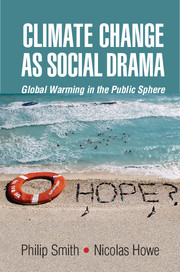Book contents
- Frontmatter
- Contents
- Acknowledgments
- 1 Introduction: The Problem of Climate Change
- 2 Climate Change as Social Drama
- 3 Narrating Global Warming
- 4 An Inconvenient Truth: The Power of Ethos
- 5 Climate Change Art: An Illustrative Failure?
- 6 Climategate and Other Controversies
- 7 The Climate Conference as Theatre
- 8 Local Dramas: The Places of Climate Change
- 9 Conclusion: The Show Must Go On
- References
- Index
1 - Introduction: The Problem of Climate Change
Published online by Cambridge University Press: 05 May 2015
- Frontmatter
- Contents
- Acknowledgments
- 1 Introduction: The Problem of Climate Change
- 2 Climate Change as Social Drama
- 3 Narrating Global Warming
- 4 An Inconvenient Truth: The Power of Ethos
- 5 Climate Change Art: An Illustrative Failure?
- 6 Climategate and Other Controversies
- 7 The Climate Conference as Theatre
- 8 Local Dramas: The Places of Climate Change
- 9 Conclusion: The Show Must Go On
- References
- Index
Summary
Scientists agree that anthropogenic climate change is real and that it is a very serious threat on multiple levels for the entire planet (IPCC 2014). Economic, social, political, and biological systems are all said to be in trouble. Moreover, the window of opportunity for dealing with the problem is limited. At the same time, the public around the globe is mostly apathetic. Even in countries like Norway, where high levels of environmental concern and political involvement are the norm, climate change often seems more like “background noise” than a problem demanding radical collective action (Norgaard 2011). Contrary to what one might think, a similar situation pertains in the United States. Here, despite an effective right-wing campaign to discredit climate science (Oreskes and Conway 2010), surveys today show that a majority of people believe that climate change is happening and needs to be addressed, including, now, a majority of Republicans (Maibach et al. 2013). Yet many of these same surveys indicate that most Americans are unwilling to make meaningful sacrifices to deal with the problem. There appears to be insufficient support for social mobilization of the kind that will make a real difference (for a dissenting view, see Krosnick and MacInnis 2013). True enough, political and bureaucratic elites can mandate the kinds of policies advocated by climate science, with its long-term, evidence-based views. Yet there will be problems with compliance and implementation when public buy-in is weak. In democratic contexts, electoral sanctions can follow if cultural horizons for responding to climate change are not aligned with public policies (Lorenzoni and Pidgeon 2006).
What exactly is the problem? It is not simply that there is a substantial corps of climate change deniers confusing the public with nefarious tactics, nor is it that the carbon industries have easily bought off political leaders. The issue is more subtle.
- Type
- Chapter
- Information
- Climate Change as Social DramaGlobal Warming in the Public Sphere, pp. 1 - 14Publisher: Cambridge University PressPrint publication year: 2015

